- Home
- Louisa May Alcott
The Annotated Little Women Page 30
The Annotated Little Women Read online
Page 30
“Tell us about it.” “When did it come?” “How much did you get for it?” “What will father say?” “Won’t Laurie laugh?” cried the family, all in one breath, as they clustered about Jo; for these foolish, affectionate people made a jubilee of every little household joy.
“Stop jabbering, girls, and I’ll tell you everything,” said Jo, wondering if Miss Burney felt any grander over her “Evelina,”11 than she did over her “Rival Painters.” Having told how she disposed of her tales, Jo added,—“And when I went to get my answer the man said he liked them both, but didn’t pay beginners, only let them print in his paper, and noticed the stories. It was good practice, he said; and, when the beginners improved, any one would pay. So I let him have the two stories, and today this was sent to me, and Laurie caught me with it, and insisted on seeing it, so I let him; and he said it was good, and I shall write more, and he’s going to get the next paid for, and oh—I am so happy, for in time I may be able to support myself and help the girls.”
Jo’s breath gave out here; and, wrapping her head in the paper, she bedewed her little story with a few natural tears; for to be independent, and earn the praise of those she loved, were the dearest wishes of her heart, and this seemed to be the first step toward that happy end.
1. Scrabble. The name of Jo’s rat, which long antedates the board game, is actually a pun. For an animal to scrabble means to scratch about hurriedly with its paws. According to the Oxford English Dictionary, a person who scrabbles writes in a scribbling, scrawling manner. Thus both Jo and her rat are true “scrabblers.”
2. tin kitchen. A tin kitchen was a kind of reflector oven used for roasting meat before a fire.
3. omnibus. An omnibus was a horse-drawn passenger vehicle. The photograph shows one used in Concord in Alcott’s time.
An especially popular omnibus. (Photo by London Stereoscopic Company / Getty Images)
4. “the fencing scene.” In the last scene of Shakespeare’s Hamlet, Laertes and Hamlet fight a duel. Laertes fatally wounds Hamlet with a poisoned sword. Then the two switch weapons, and Hamlet fatally stabs Laertes with Laertes’s own blade.
5. “any plummy bit of news I get.” “Plummy” was a slang term, much used by Alcott, for rich, good, or desirable.
6. Atlanta. Misspelled here by either Alcott or her editors, Atalanta was an athletic girl in Greek myth who would consent to marry only the suitor who could defeat her in a footrace. After besting many suitors, she finally lost to Melanion, who strewed her path with golden apples given him by Aphrodite. Atalanta stopped to collect each apple and thus lost the race. Alcott’s own superiority as a runner was fondly recalled by her girlhood friend Frederick Llewellyn Hovey Willis, who wrote, “She could run like a gazelle. She was the most beautiful girl runner I ever saw” (Shealy, ed., Alcott in Her Own Time, p. 177). Willis’s recollections of the Alcotts were posthumously published as Alcott Memoirs (Boston: Richard G. Badger, 1915).
7. state and festival suit. A coordinated outfit, worn on formal and social occasions.
8. “comme la fo.” Amy tries and fails for a second time to master the French phrase “comme il faut.” See Part First, Chapter X, Note 4.
9. “The Rival Painters.” “The Rival Painters: A Tale of Rome” was the title of Alcott’s first published story, written when she was sixteen and appearing in print three years later. Unlike the fictionalized version in Little Women, the actual story featured lovers named Madeline and Guido, and the two characters finish the story alive and happily united. Alcott received five dollars for the tale, which appeared in the Olive Branch XVII, no. 19 (May 8, 1852). Alcott recalled her moment of triumph in her journal: “Great rubbish! Read it aloud to sisters, and when they praised it, not knowing the author, I proudly announced her name” (Louisa May Alcott, Journals, p. 67).
10. “Spread Eagle.” The Spread Eagle is Alcott’s invention; no journal of that name appears to have existed.
11. “Evelina.” English author Frances Burney’s three-volume epistolary novel Evelina was published anonymously in 1778 to wide acclaim. First exposed to the novel as a girl, Alcott reread Evelina with pleasure in June 1861 and called it “dear old ‘Evelina’ ” in her journal for that month (Louisa May Alcott, Journals, p. 105).
CHAPTER XV.
A Telegram.
“NOVEMBER is the most disagreeable month in the whole year,” said Margaret, standing at the window one dull afternoon, looking out at the frost-bitten garden.
“That’s the reason I was born in it,”1 observed Jo, pensively, quite unconscious of the blot on her nose.
“If something very pleasant should happen now, we should think it a delightful month,” said Beth, who took a hopeful view of everything, even November.
“I dare say; but nothing pleasant ever does happen in this family,” said Meg, who was out of sorts. “We go grubbing along day after day, without a bit of change, and very little fun. We might as well be in a tread-mill.”
“My patience, how blue we are!” cried Jo. “I don’t much wonder, poor dear, for you see other girls having splendid times, while you grind, grind, year in and year out. Oh, don’t I wish I could fix things for you as I do for my heroines! you’re pretty enough and good enough already, so I’d have some rich relation leave you a fortune unexpectedly; then you’d dash out as an heiress, scorn every one who has slighted you, go abroad, and come home my Lady Something, in a blaze of splendor and elegance.”2
“People don’t have fortunes left them in that style nowadays; men have to work, and women to marry for money. It’s a dreadfully unjust world,” said Meg, bitterly.
“Jo and I are going to make fortunes for you all; just wait ten years, and see if we don’t,” said Amy, who sat in a corner making “mud pies,” as Hannah called her little clay models of birds, fruit and faces.
“Can’t wait, and I’m afraid I haven’t much faith in ink and dirt, though I’m grateful for your good intentions.”
Meg sighed, and turned to the frost-bitten garden again; Jo groaned, and leaned both elbows on the table in a despondent attitude, but Amy spatted away energetically; and Beth, who sat at the other window, said, smiling, “Two pleasant things are going to happen right away; Marmee is coming down the street, and Laurie is tramping through the garden as if he had something nice to tell.”
In they both came, Mrs. March with her usual question, “Any letter from father, girls?” and Laurie to say, in his persuasive way, “Won’t some of you come for a drive? I’ve been pegging away at mathematics till my head is in a muddle, and I’m going to freshen my wits by a brisk turn. It’s a dull day, but the air isn’t bad, and I’m going to take Brooke home, so it will be gay inside, if it isn’t out. Come, Jo, you and Beth will go, won’t you?”
“Of course we will.”
“Much obliged, but I’m busy;” and Meg whisked out her work-basket, for she had agreed with her mother that it was best, for her at least, not to drive often with the young gentleman.
“We three will be ready in a minute,” cried Amy, running away to wash her hands.
“Can I do anything for you, Madam Mother?” asked Laurie, leaning over Mrs. March’s chair, with the affectionate look and tone he always gave her.
“No, thank you, except call at the office, if you’ll be so kind, dear. It’s our day for a letter, and the penny postman hasn’t been. Father is as regular as the sun, but there’s some delay on the way, perhaps.”
A sharp ring interrupted her, and a minute after Hannah came in with a letter.
“It’s one of them horrid telegraph things, mum,” she said, handing it as if she was afraid it would explode, and do some damage.
At the word “telegraph,” Mrs. March snatched it, read the two lines it contained, and dropped back into her chair as white as if the little paper had sent a bullet to her heart. Laurie dashed down stairs for water, while Meg and Hannah supported her, and Jo read aloud, in a frightened voice,—
“MRS. MARCH:
“Your husb
and is very ill. Come at once.
“S. HALE,
“Blank Hospital, Washington.”3
How still the room was as they listened breathlessly! how strangely the day darkened outside! and how suddenly the whole world seemed to change, as the girls gathered about their mother, feeling as if all the happiness and support of their lives was about to be taken from them. Mrs. March was herself again directly; read the message over, and stretched out her arms to her daughters, saying, in a tone they never forgot, “I shall go at once, but it may be too late; oh, children, children! help me to bear it!”
For several minutes there was nothing but the sound of sobbing in the room, mingled with broken words of comfort, tender assurances of help, and hopeful whispers, that died away in tears. Poor Hannah was the first to recover, and with unconscious wisdom she set all the rest a good example; for, with her, work was the panacea for most afflictions.
“The Lord keep the dear man! I won’t waste no time a cryin’, but git your things ready right away, mum,” she said, heartily, as she wiped her face on her apron, gave her mistress a warm shake of the hand with her own hard one, and went away to work, like three women in one.
“She’s right; there’s no time for tears now. Be calm, girls, and let me think.”
They tried to be calm, poor things, as their mother sat up, looking pale, but steady, and put away her grief to think and plan for them.
“Where’s Laurie?” she asked presently, when she had collected her thoughts, and decided on the first duties to be done.
“Here, ma’am; oh, let me do something!” cried the boy, hurrying from the next room, whither he had withdrawn, feeling that their first sorrow was too sacred for even his friendly eyes to see.
“Send a telegram saying I will come at once. The next train goes early in the morning; I’ll take that.”
“What else? The horses are ready; I can go anywhere,—do anything,” he said, looking ready to fly to the ends of the earth.
“Leave a note at Aunt March’s. Jo, give me that pen and paper.”
Tearing off the blank side of one of her newly-copied pages, Jo drew the table before her mother, well knowing that money for the long, sad journey, must be borrowed, and feeling as if she could do anything to add a little to the sum for her father.
“Now go, dear; but don’t kill yourself driving at a desperate pace; there is no need of that.”
Mrs. March’s warning was evidently thrown away; for five minutes later Laurie tore by the window, on his own fleet horse, riding as if for his life.
“Jo, run to the rooms, and tell Mrs. King that I can’t come. On the way get these things. I’ll put them down; they’ll be needed, and I must go prepared for nursing. Hospital stores are not always good. Beth, go and ask Mr. Laurence for a couple of bottles of old wine; I’m not too proud to beg for father; he shall have the best of everything. Amy, tell Hannah to get down the black trunk; and Meg, come and help me find my things, for I’m half bewildered.”
Writing, thinking, and directing all at once, might well bewilder the poor lady, and Meg begged her to sit quietly in her room for a little while, and let them work. Every one scattered, like leaves before a gust of wind; and the quiet, happy household was broken up as suddenly as if the paper had been an evil spell.
Mr. Laurence came hurrying back with Beth, bringing every comfort the kind old gentleman could think of for the invalid, and friendliest promises of protection for the girls, during the mother’s absence, which comforted her very much. There was nothing he didn’t offer, from his own dressing-gown to himself as escort. But that last was impossible. Mrs. March would not hear of the old gentleman’s undertaking the long journey; yet an expression of relief was visible when he spoke of it, for anxiety ill fits one for travelling. He saw the look, knit his heavy eyebrows, rubbed his hands, and marched abruptly away, saying he’d be back directly. No one had time to think of him again till, as Meg ran through the entry, with a pair of rubbers in one hand and a cup of tea in the other, she came suddenly upon Mr. Brooke.
“I’m very sorry to hear of this, Miss March,” he said, in the kind, quiet tone which sounded very pleasantly to her perturbed spirit. “I came to offer myself as escort to your mother. Mr. Laurence has commissions for me in Washington, and it will give me real satisfaction to be of service to her there.”
Down dropped the rubbers, and the tea was very near following, as Meg put out her hand, with a face so full of gratitude, that Mr. Brooke would have felt repaid for a much greater sacrifice than the trifling one of time and comfort, which he was about to make.
“How kind you all are! Mother will accept, I’m sure; and it will be such a relief to know that she has some one to take care of her. Thank you very, very much!”
Meg spoke earnestly, and forgot herself entirely till something in the brown eyes looking down at her made her remember the cooling tea, and lead the way into the parlor, saying she would call her mother.
Everything was arranged by the time Laurie returned with a note from Aunt March, enclosing the desired sum, and a few lines repeating what she had often said before, that she had always told them it was absurd for March to go into the army, always predicted that no good would come of it, and she hoped they would take her advice next time. Mrs. March put the note in the fire, the money in her purse, and went on with her preparations, with her lips folded tightly, in a way which Jo would have understood if she had been there.
The short afternoon wore away; all the other errands were done, and Meg and her mother busy at some necessary needle-work, while Beth and Amy got tea, and Hannah finished her ironing with what she called a “slap and a bang,” but still Jo did not come. They began to get anxious; and Laurie went off to find her, for no one ever knew what freak Jo might take into her head. He missed her, however, and she came walking in with a very queer expression of countenance, for there was a mixture of fun and fear, satisfaction and regret in it, which puzzled the family as much as did the roll of bills she laid before her mother, saying, with a little choke in her voice, “That’s my contribution towards making father comfortable, and bringing him home!”
“My dear, where did you get it! Twenty-five dollars! Jo, I hope you haven’t done anything rash?”
“No, it’s mine honestly; I didn’t beg, borrow, nor steal it. I earned it; and I don’t think you’ll blame me, for I only sold what was my own.”
As she spoke, Jo took off her bonnet, and a general outcry arose, for all her abundant hair was cut short.4
“Your hair! Your beautiful hair!” “Oh, Jo, how could you? Your one beauty.”5 “My dear girl, there was no need of this.” “She don’t look like my Jo any more, but I love her dearly for it!”
As every one exclaimed, and Beth hugged the cropped head tenderly, Jo assumed an indifferent air, which did not deceive any one a particle, and said, rumpling up the brown bush, and trying to look as if she liked it, “It doesn’t affect the fate of the nation, so don’t wail, Beth. It will be good for my vanity; I was getting too proud of my wig. It will do my brains good to have that mop taken off; my head feels deliciously light and cool, and the barber said I could soon have a curly crop, which will be boyish,6 becoming, and easy to keep in order. I’m satisfied; so please take the money, and let’s have supper.”
Artist Harold Copping envisioned the sacrifice of Jo’s hair.
“Tell me all about it, Jo; I am not quite satisfied, but I can’t blame you, for I know how willingly you sacrificed your vanity, as you call it, to your love. But, my dear, it was not necessary, and I’m afraid you will regret it, one of these days,” said Mrs. March.
“No I won’t!” returned Jo, stoutly, feeling much relieved that her prank was not entirely condemned.
“What made you do it?” asked Amy, who would as soon have thought of cutting off her head as her pretty hair.
“Well, I was wild to do something for father,” replied Jo, as they gathered about the table, for healthy young people can eat even in the midst
of trouble. “I hate to borrow as much as mother does, and I knew Aunt March would croak; she always does, if you ask for a ninepence.7 Meg gave all her quarterly salary toward the rent, and I only got some clothes with mine, so I felt wicked, and was bound to have some money, if I sold the nose off my face to get it.”
“You needn’t feel wicked, my child, you had no winter things, and got the simplest, with your own hard earnings,” said Mrs. March, with a look that warmed Jo’s heart.
“I hadn’t the least idea of selling my hair at first, but as I went along I kept thinking what I could do, and feeling as if I’d like to dive into some of the rich stores and help myself. In a barber’s window I saw tails of hair with the prices marked; and one black tail, longer, but not so thick as mine, was forty dollars. It came over me all of a sudden that I had one thing to make money out of, and, without stopping to think, I walked in, asked if they bought hair, and what they would give for mine.”
“I don’t see how you dared to do it,” said Beth, in a tone of awe.
“Oh, he was a little man who looked as if he merely lived to oil his hair. He rather stared, at first, as if he wasn’t used to having girls bounce into his shop and ask him to buy their hair. He said he didn’t care about mine, it wasn’t the fashionable color, and he never paid much for it in the first place; the work put into it made it dear, and so on. It was getting late, and I was afraid, if it wasn’t done right away, that I shouldn’t have it done at all, and you know, when I start to do a thing, I hate to give it up; so I begged him to take it, and told him why I was in such a hurry. It was silly, I dare say, but it changed his mind, for I got rather excited, and told the story in my topsy-turvy way, and his wife heard, and said so kindly,”—

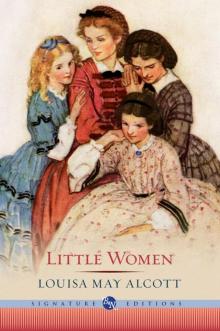 Little Women
Little Women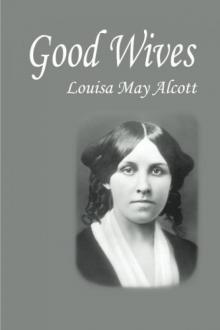 Good Wives
Good Wives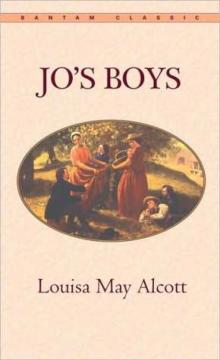 Jo's Boys
Jo's Boys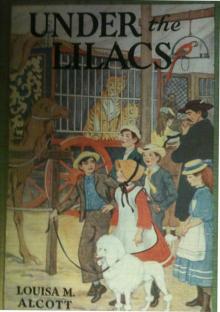 Under the Lilacs
Under the Lilacs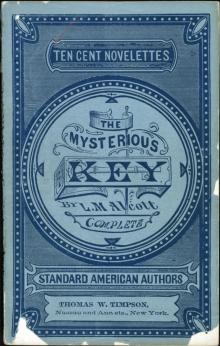 The Mysterious Key and What It Opened
The Mysterious Key and What It Opened The Inheritance
The Inheritance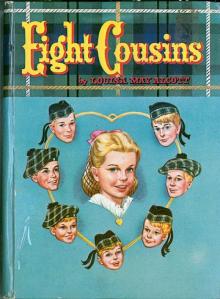 Eight Cousins
Eight Cousins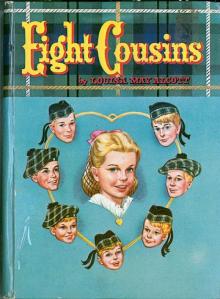 Eight Cousins; Or, The Aunt-Hill
Eight Cousins; Or, The Aunt-Hill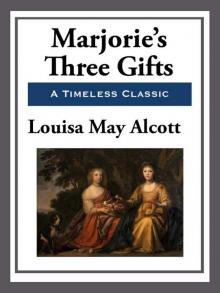 Marjorie's Three Gifts
Marjorie's Three Gifts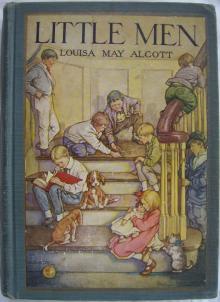 Little Men
Little Men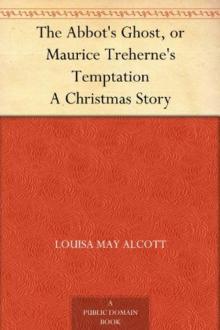 The Abbot's Ghost, or Maurice Treherne's Temptation: A Christmas Story
The Abbot's Ghost, or Maurice Treherne's Temptation: A Christmas Story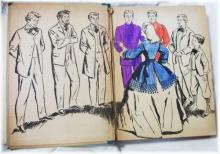 Rose in Bloom
Rose in Bloom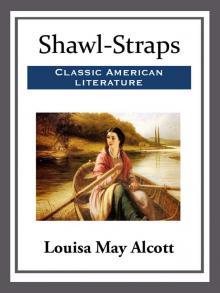 Shawl-Straps
Shawl-Straps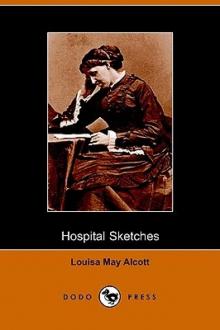 Hospital Sketches
Hospital Sketches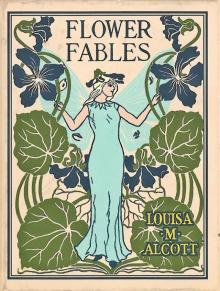 Flower Fables
Flower Fables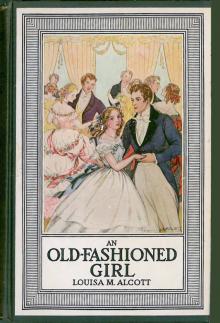 An Old-Fashioned Girl
An Old-Fashioned Girl The Candy Country
The Candy Country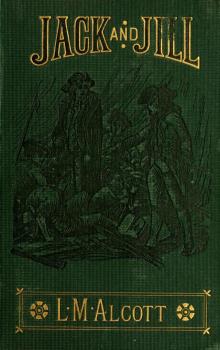 Jack and Jill
Jack and Jill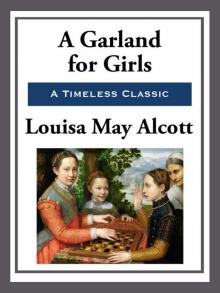 A Garland for Girls
A Garland for Girls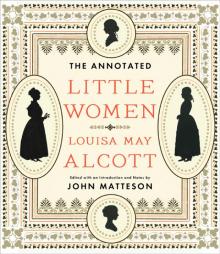 The Annotated Little Women
The Annotated Little Women A Classic Christmas
A Classic Christmas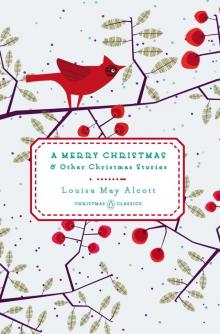 A Merry Christmas
A Merry Christmas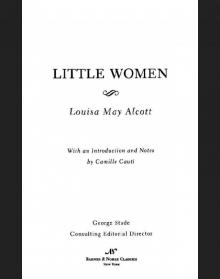 Little Women (Barnes & Noble Classics Series)
Little Women (Barnes & Noble Classics Series)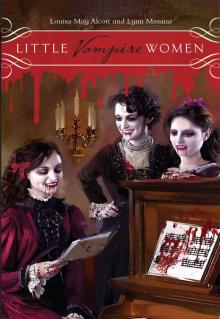 Little Vampire Women
Little Vampire Women